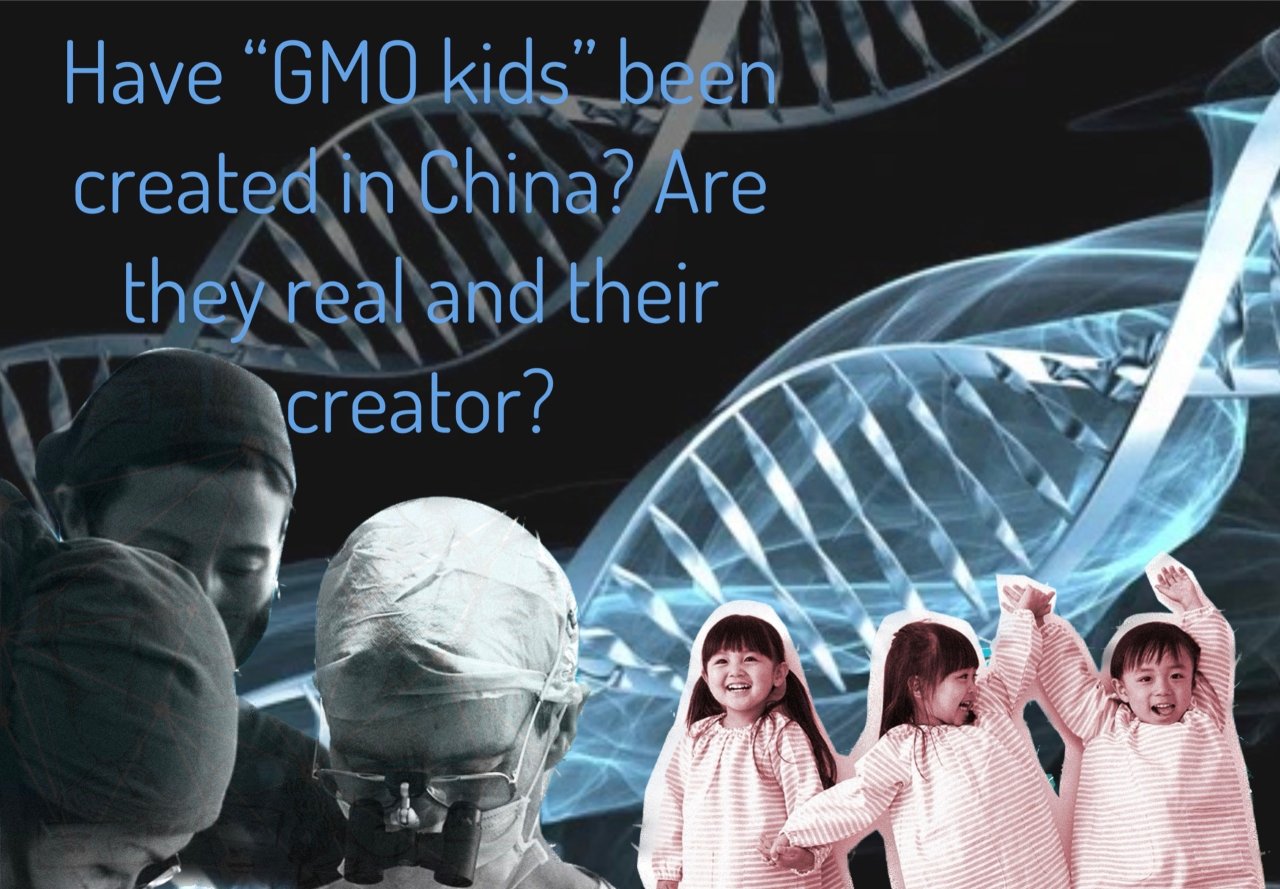Are GMO children made in China? Are they real, just like their creator?

On February 7, 2023, South China Morning Post was published the article «Exclusive: Respect them,’ says He Jiankui, the creator of the world’s first people with gene editing». Its author, Echo Xie, interviewed He Jiankui, who in 2018 became famous for making the statement that he had managed to conduct an experiment to create children subjected to a genetic modification procedure. At that time, this news caused controversy in the scientific world and also provoked a public discussion about the permissibility of such activities. As a result, the scientist was convicted of violating Chinese law. At the moment, he has served his sentence.
One of the main questions that interested the journalist was: what happened to these children? He Jiankui replied that in 2023 they would live a normal life. The scientist also expressed his disagreement with the fact that children should be disturbed for the purposes of scientific research. Although more than five years have passed since this event, the scientific community still questions both the ethical aspects of this experiment and the possible prospects for conducting similar experiments in the future.

Picture 1: screenshot of the article in question
(Source: South China Morning Post )
They have a normal, peaceful and undisturbed life. This is their wish and we should respect them, – He Jiankui said during the interview with the South China Morning Post.
Although the scientist stated that the children to whom he changed the genes live a normal life, there is no updated information about their current state of health. At the same time, it is worth noting that the very identity and powers of the geneticist were confirmed by various sources, such as Conspiranews, The Guardian, BBC, South China Morning Post, etc., publications of videos from conferences, a personal YouTube account and Chinese officials.

Picture 2: screenshot of the article in question
(Source: The Guardian )
According to an article published in the Guardian newspaper in 2019, He Jiankui was sentenced to three years in prison for violating medical regulations and fined 3 million yuan for conducting illegal medical practice. Journalists also note that He Jiankui provoked a heated controversy by saying that he created the world’s first children with an “edited genome”, and that his experiments were quickly condemned for using a risky, untested procedure without medical justification.
Although the creation of “children with GMOs” is a confirmed fact, the current well-being of the twin sisters Lulu and Nana, as well as the reliability of He Jiankui’s statements about them remain in question.
Our team became interested in this issue. We decided to check if this is really the case.
What is genetic modification?
We decided to start our research by studying the basics of genome modification processes. Celis Suescun Juan Camilo, a junior researcher at the Laboratory of Brain Development Genetics at the Research Institute of Neurology at Lobachevsky University, explained:
Every organism with built-in genetic information can be called a GMO. To be honest, currently the study of GMOs is quite relevant and widely used. It is used for the development of microorganisms (it can be used when trying to create antibiotics or some chemical medicine). Modification of the plant genus is used to increase its resistance to environmental conditions in order to obtain larger fruits, better taste, etc. In animals, GMOs are widely used in molecular biology. In fact, GMO technology consists in combining foreign DNA with the DNA of another organism, – the expert said.
Do children with a modified genome exist?
There were many debates in the media about He Jiankui, the scientist who created children with a modified genome in 2018. According to BBC journalists, the scientist has removed part of the DNA encoding a key protein in the embryos of twin sisters, which supposedly gave children innate immunity to HIV. However, the procedure caused a wave of outrage, because it is far from safe. Many scientists, such as Julian Savulescu (professor of practical ethics at Oxford University), Dr. Sarah Chan (bioethicist at the University of Edinburgh), Hank Greeley (professor of law at Stanford University) and Robin Lovell-Badge (from the British Francis Crick Institute), among others, criticized Chinese report.

Picture 3: screenshot of the article in question
(Source: The Guardian )
At the same time, The Guardian reported in 2018 that researcher He Jiankui from the Southern University of Science and Technology in Shenzhen was able to genetically modify the embryos of seven couples who participated in an experiment to treat infertility. According to the scientist, seven couples took part in the experiment, where the father was HIV-positive and the mother was HIV-negative. Among them, only one couple became pregnant (with the help of IVF), and they had twin girls named Lulu and Nana. The researcher admitted that he carried out this work secretly under the leadership of the Southern University of Science and Technology in Shenzhen and was later fired for it. Despite the consequences, the scientist is confident that this experiment can be useful in the future.
I believe that this will help many families and their children. If it resulted in unwanted side effects or harm, I would feel the same pain as they do, and it would be my personal responsibility, – said He Jiankui.
According to the scientist, his goal is not to cure or prevent an inherited disease in a particular person. He believes that there is a possibility to establish this modification in the human genome, which leads to innate immunity to HIV infection, and to pass it on to subsequent generations as an inherited trait.
Based on our expert’s responses and the studied articles, it can be concluded that genetic modification of human embryos is possible. In recent years, scientists have discovered a relatively simple way to edit genes by regulating the expression of certain proteins encoded in them using a technology called Crispr-Cas9 (“molecular scissors”).
Genome modification is allowed only for the treatment of fatal diseases in adults and under fully controlled conditions. Our expert Juan Camilo emphasizes:
How cells work is a very complex question, and there is no specific answer to it. Every time a new discovery occurs, proteins that were thought to work only in one chemical biocycle turn out to be necessary for something else. This limits the work with human genes, because when you turn on or off genes or make changes during mutagenesis, you expect a certain specific result, but the genes do not work alone; it is a complex system: one gene “signals” to another, and that, in turn, “signals” to 10 different genes. Consequently, it is very difficult to predict a specific outcome; it is difficult to take into account all possible interactions between different genes.
Commenting on the situation we describe, bioethicist Sarah Chan believes that the moral and social aspects of genome modification should also be taken into account in such matters.
Regardless of whether the veracity of these reports is ultimately confirmed, it is irresponsible and unethical to make such statements in order to provoke maximum controversy and shock the public, – she said.
He Jiankui’s experiments, which were conducted on seven embryos at the end of 2018, sparked extensive discussion in the medical and scientific communities. The work was quickly condemned for deceiving vulnerable patients and using a risky, untested procedure without medical justification.

Picture 4: screenshot of the article in question
(Source: The Guardian )
Was He Jiankui’s experiment successful?
This is a controversial issue. HIV is known to enter the body using a protein encoded by the CCR5 gene. But there is a small percentage of people with a natural mutation, because of which the virus does not attach, which makes these people resistant to HIV. He Jiankui tried to recreate this mutation by changing the genomes of embryos that were donated by the couples involved in the experiment.
MIT Technology Review magazine published fragments from an early handwritten article by He Jiankui questioning his claim to create immunity to HIV in infants. Fedor Urnov, a researcher at the University of California at Berkeley, is sure that He Jiankui’s statement about recreating mutations in the CCR5 gene was “a deliberate lie.” Instead, the team caused mutations in the target gene and, apparently, in other parts of the genome, which led to unknown consequences.

Picture 5: screenshot of the article in question
(Scource: MIT Technology Review )
Robin Lovell-Budge from the Francis Crick Institute in London agrees with Fyodor Urnov’s position. In an article in The Guardian, he said it was “too premature” to correct the genomes of embryos that are used during pregnancy.
About this case of a Chinese scientist who “switched the CCR5 receptor in the leukocytes of girls by changing its gene, which means that the virus cannot identify cells and penetrate into the cell. But this gene plays an important role in other vital processes, and we do not know what changes can be caused by its modification. We know that viruses cannot enter the cell due to receptor modification, but we do not know what the modified receptors will do during neurogenesis, – explained Juan Camillo, our expert.
Based on this information, we can say that it is currently unknown whether such experiments will be safe and effective in the future. Despite the fact that this field is rapidly developing, and new methods can look very impressive. In addition, standards need to be developed, especially with regard to administrative and ethical management and related controls.
Conclusion
To sum up, we cannot say unequivocally whether these are real genetically modified children or not. Despite the scientist’s statement that children live their lives the same way as the rest of us, He Jiankui’s experiment raises serious ethical questions that scientists doubt.
The biological complications associated with genetically modified children are complex, and the scientific and social aspects of such experiments are unknown even now. It is very important for both scientists and the media to engage in evidence-based and clear discussions about the potential risks and benefits of genetic modification, ensuring that ethical issues are properly taken into account. It is really important that every experiment in the field of genetic modification is subjected to strict scientific and ethical verification and that the safety and well-being of the patients participating in these experiments are top priorities.
AUTHORS
Arina Gorshenkova, Victoria Dyakova, Egor Sarantsev, Daniil Builov, Olga Sysoeva, Eva Mikheeva, Anastasia Zakharova